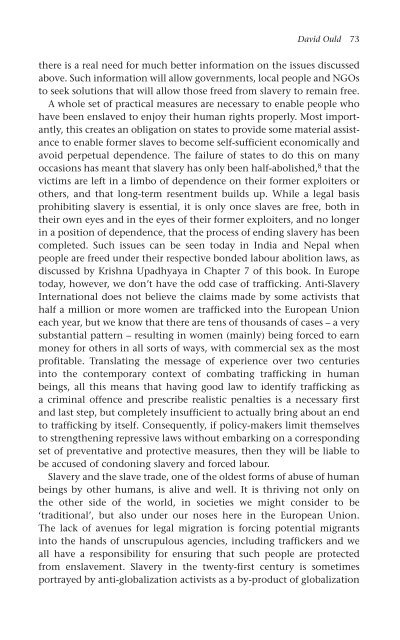3071-The political economy of new slavery
3071-The political economy of new slavery
3071-The political economy of new slavery
Create successful ePaper yourself
Turn your PDF publications into a flip-book with our unique Google optimized e-Paper software.
David Ould 73<br />
there is a real need for much better information on the issues discussed<br />
above. Such information will allow governments, local people and NGOs<br />
to seek solutions that will allow those freed from <strong>slavery</strong> to remain free.<br />
A whole set <strong>of</strong> practical measures are necessary to enable people who<br />
have been enslaved to enjoy their human rights properly. Most importantly,<br />
this creates an obligation on states to provide some material assistance<br />
to enable former slaves to become self-sufficient economically and<br />
avoid perpetual dependence. <strong>The</strong> failure <strong>of</strong> states to do this on many<br />
occasions has meant that <strong>slavery</strong> has only been half-abolished, 8 that the<br />
victims are left in a limbo <strong>of</strong> dependence on their former exploiters or<br />
others, and that long-term resentment builds up. While a legal basis<br />
prohibiting <strong>slavery</strong> is essential, it is only once slaves are free, both in<br />
their own eyes and in the eyes <strong>of</strong> their former exploiters, and no longer<br />
in a position <strong>of</strong> dependence, that the process <strong>of</strong> ending <strong>slavery</strong> has been<br />
completed. Such issues can be seen today in India and Nepal when<br />
people are freed under their respective bonded labour abolition laws, as<br />
discussed by Krishna Upadhyaya in Chapter 7 <strong>of</strong> this book. In Europe<br />
today, however, we don’t have the odd case <strong>of</strong> trafficking. Anti-Slavery<br />
International does not believe the claims made by some activists that<br />
half a million or more women are trafficked into the European Union<br />
each year, but we know that there are tens <strong>of</strong> thousands <strong>of</strong> cases – a very<br />
substantial pattern – resulting in women (mainly) being forced to earn<br />
money for others in all sorts <strong>of</strong> ways, with commercial sex as the most<br />
pr<strong>of</strong>itable. Translating the message <strong>of</strong> experience over two centuries<br />
into the contemporary context <strong>of</strong> combating trafficking in human<br />
beings, all this means that having good law to identify trafficking as<br />
a criminal <strong>of</strong>fence and prescribe realistic penalties is a necessary first<br />
and last step, but completely insufficient to actually bring about an end<br />
to trafficking by itself. Consequently, if policy-makers limit themselves<br />
to strengthening repressive laws without embarking on a corresponding<br />
set <strong>of</strong> preventative and protective measures, then they will be liable to<br />
be accused <strong>of</strong> condoning <strong>slavery</strong> and forced labour.<br />
Slavery and the slave trade, one <strong>of</strong> the oldest forms <strong>of</strong> abuse <strong>of</strong> human<br />
beings by other humans, is alive and well. It is thriving not only on<br />
the other side <strong>of</strong> the world, in societies we might consider to be<br />
‘traditional’, but also under our noses here in the European Union.<br />
<strong>The</strong> lack <strong>of</strong> avenues for legal migration is forcing potential migrants<br />
into the hands <strong>of</strong> unscrupulous agencies, including traffickers and we<br />
all have a responsibility for ensuring that such people are protected<br />
from enslavement. Slavery in the twenty-first century is sometimes<br />
portrayed by anti-globalization activists as a by-product <strong>of</strong> globalization


